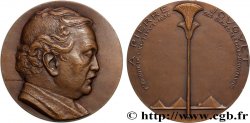fme_988196 - III REPUBLIC PHILIPPE DUC D’ORLÉANS, frappe médaille module de 10 centimes
12.00 €(Approx. 12.48$ | 9.96£)
Quantity
Add to your cart

Type : PHILIPPE DUC D’ORLÉANS, frappe médaille module de 10 centimes
Date: 1899
Metal : brass
Diameter : 30,5 mm
Orientation dies : 12 h.
Weight : 7,50 g.
Edge : lisse
Puncheon : sans poinçon
Coments on the condition:
Médaille ayant été nettoyée. De l’usure sur les reliefs. Taches d’oxydation
Obverse
Obverse legend : PHILIPPE DUC D’ORLÉANS 1899.
Obverse description : Son buste de trois-quarts à gauche.
Reverse
Reverse legend : JE NE VENGERAI QUE LES INJURES FAITES Â LA NATION * PHILIPPE * / SUR HUIT LIGNES : JE / REPLACERAI / MON PAYS / AU PREMIER RANG / DES NATIONS / AVEC LE CONCOURS / DE TOUS LES VRAIS / FRANÇAIS.
Commentary
Il existe une autre version très proche datée 1900 et une autre variée et datée de 1909 avec la formule Tout ce qui est national est nôtre.
Philippe, duc d'Orléans est surtout resté dans l'Histoire pour être retourné en France, en 1890, bravant ainsi les lois d'exil qui, depuis 1886, en tenaient la famille royale éloignée. Arrêté après s'être présenté au bureau de recrutement de Paris pour faire son service militaire (ce qui lui valut le surnom de "prince gamelle"), il fut condamné à deux années d'emprisonnement et expulsé. Prétendant au trône de France depuis la mort de son père, en 1894, il vécut l'essentiel de sa vie en Angleterre. Marié en 1896 à l'archiduchesse Marie-Dorothée d'Autriche, il mourut sans descendance en 1926. Ses droits dynastiques passèrent alors à son cousin Jean, duc de Guise, père du Prince Henri d'Orléans (biographie extraite de http://www.musee-orsay.fr/fr/evenements/expositions/archives/presentation-generale/browse/12/article/photographies-de-philippe-duc-dorleans-4189.html?tx_ttnews[backPid]=252&cHash=70b983c279 ).
Philippe, duc d'Orléans est surtout resté dans l'Histoire pour être retourné en France, en 1890, bravant ainsi les lois d'exil qui, depuis 1886, en tenaient la famille royale éloignée. Arrêté après s'être présenté au bureau de recrutement de Paris pour faire son service militaire (ce qui lui valut le surnom de "prince gamelle"), il fut condamné à deux années d'emprisonnement et expulsé. Prétendant au trône de France depuis la mort de son père, en 1894, il vécut l'essentiel de sa vie en Angleterre. Marié en 1896 à l'archiduchesse Marie-Dorothée d'Autriche, il mourut sans descendance en 1926. Ses droits dynastiques passèrent alors à son cousin Jean, duc de Guise, père du Prince Henri d'Orléans (biographie extraite de http://www.musee-orsay.fr/fr/evenements/expositions/archives/presentation-generale/browse/12/article/photographies-de-philippe-duc-dorleans-4189.html?tx_ttnews[backPid]=252&cHash=70b983c279 ).








 Report a mistake
Report a mistake Print the page
Print the page Share my selection
Share my selection Ask a question
Ask a question Consign / sell
Consign / sell
 Full data
Full data









